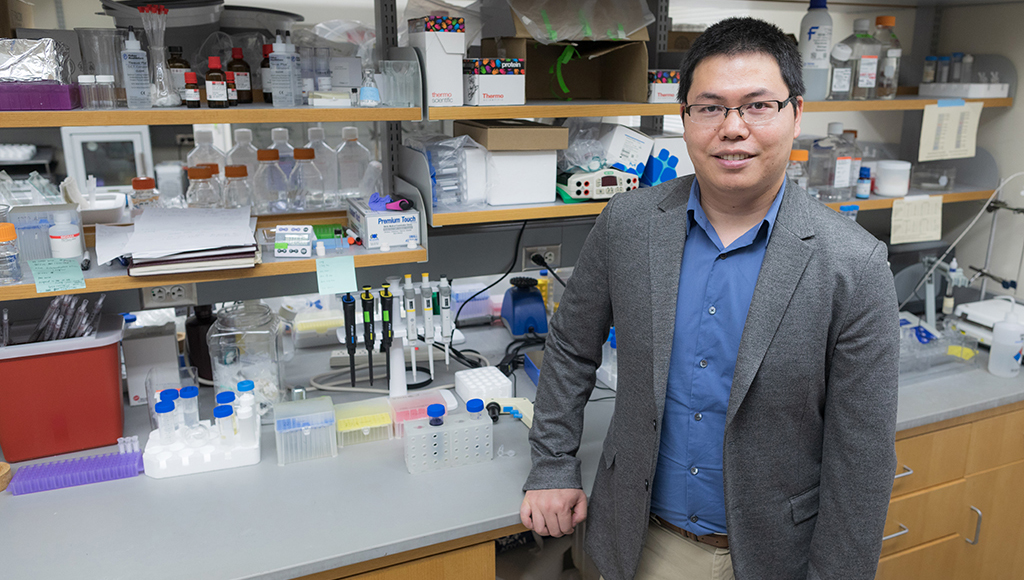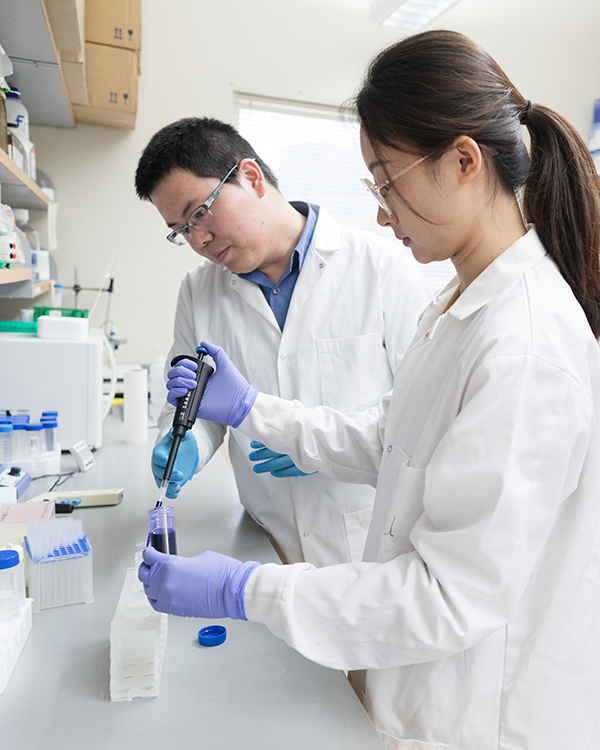
The competitive award recognizes Hu’s innovations in cell therapy research and fuels more development
By Logan Underwood
Between receiving several early career researcher awards, being recognized by scientific journals, and conducting groundbreaking studies, Assistant Professor Quanyin Hu, of the University of Wisconsin-Madison School of Pharmacy Pharmaceutical Sciences Division, seems to have a full plate. Still, Hu’s appetite for new research endeavors is only growing.
In 2024, Hu was honored by the UW–Madison Vilas Associates Competition, which recognizes new and ongoing research of the highest quality and significance. In addition to acknowledging the broad impact of his work, the award also provides funding to propel Hu’s research to even greater heights.
Hu’s Cell-Inspired Personalized Therapeutic (CIPT) Lab, first created when he joined the School of Pharmacy in 2020, focuses on translational research involving how engineered cells can lead to breakthroughs in fighting diseases like cancer and inflammatory bowel disease.
Considering his CIPT Lab is only a few years old, Hu was pleasantly surprised to learn that he was selected as a winner in the Vilas Associates Competition, alongside established professors and scientists with decades of experience.
“I feel incredibly excited that I received the award,” Hu says. “I only started my lab three and a half years ago, but I think that science speaks for everything.”
‘Science speaks’
Hu’s CIPT lab has led numerous important research projects — even landing on the Institute for Scientific Information’s list of Highly Cited Researchers in 2022 and 2023, which honors researchers whose citations put them in the top 1 percent of their field. One of Hu’s most renowned endeavors involved developing probiotic “backpacks” to treat inflammatory bowel disease (IBD).

The CIPT lab group developed specialized nanoparticles that could neutralize molecules that activate IBD symptoms. The group also created a way to protect these nanoparticles by attaching them to beneficial bacteria.
Along with researching how the control of pyroptosis, a form of programmed cell death, can fight cancer and developing a method leveraging the mechanics of blood clots to target tumors with therapeutics, Hu is continually looking for ways to develop direct applications of pharmaceutical research to help people.
The lab’s current research is focused on two different directions of cell engineering: First, Hu is researching how bioengineered cells can be used as therapeutics, which could be applied to cancer, IBD, or auto-immune diseases. Concurrently, Hu and his lab are also developing cells to work as a delivery system to carry drugs to the diseased areas of the body.
Most recently, the CIPT lab has become interested in developing and delivering small-molecule protein degraders. The construction and delivery of the protein degraders will help facilitate the application of these small molecules to treat the diseases of real patients.
“I would like to see as many applications as possible with these new small molecules,” Hu says.
The Vilas Associates award will play a pivotal role in funding Hu’s research. With this additional support, which spans two years, Hu and the hardworking team of the CIPT lab will be able to help more patients by providing them with innovative treatment options.
“This award is critical for my lab,” says Hu. “It’s a means to extend our research direction with this small molecule research and integrate them to our established cell engineering strategies for more biomedical applications.”
A combined effort
In light of this recognition, Hu acknowledges the support and collaboration of each member of his CIPT Lab.
“I would like to thank all the contributions and hard work from my lab members,” says Hu. “I couldn’t do this research without them.”
Hu says the support from his mentors and guidance committee have been just as crucial. They played a vital role in helping direct the earliest stages of the CIPT lab during the midst of the COVID-19 pandemic.
“I felt grateful to be able to walk into the supportive environment of the School of Pharmacy and have my research thrive here.”
—Quanyin Hu
For Hu, UW–Madison has been a perfect place to conduct his groundbreaking research. He noted the campus’ emphasis on collaboration and encouragement.
He was able to create a new lab, recruit productive students, and start developing his initial projects because of the support he received after transferring from post-doctoral research at the Massachusetts Institute of Technology to the UW–Madison School of Pharmacy.
“I felt grateful to be able to walk into the supportive environment of the School of Pharmacy and have my research thrive here,” Hu says.